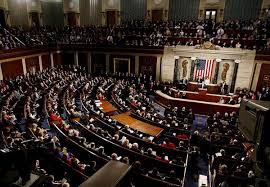Lawmakers Propose Carve-Out To “Don’t Ask, Don’t Tell”
Bill Would Allow Gay Troops to Testify Openly in Congress
SANTA BARBARA, CA, – Congressman Alcee Hastings (D-FL) today introduced legislation to allow gay members of the armed forces to testify openly at Congressional hearings. The bill, the “Honest and Open Testimony Act,” has 27 co-sponsors. If it becomes law, it will allow gay troops to testify openly without risk of discharge or other punishment. Because the “don’t ask, don’t tell” policy requires the discharge of service members who acknowledge that they are gay, lesbian, or bisexual, the bill would serve as the first relaxation of the military ban in sixteen years.
Hearings on “don’t ask, don’t tell” that were promised by the end of this year have been postponed and are now expected in early 2010. The new bill would apply to those as well as any other hearings on the topic in the House or Senate. It is seen as a “carve-out” because it would carve out, and drop, a section of “don’t ask, don’t tell” for the purpose of giving Congress access to full information.
Several recent initiatives to soften or suspend “don’t ask, don’t tell,” including a moratorium proposed by Senator Kirsten Gillibrand (D-NY) as well as a proposal by Congressman Hastings to de-fund the implementation of the ban, were blocked by Congressional leadership and the White House. The new bill is the latest in this trend, and is seen as consistent with comments by President Obama and his Defense Secretary, Robert Gates, that they are seeking “more humane” and flexible ways to apply “don’t ask, don’t tell” by relaxing its enforcement.
Scholars praised the new initiative as an effort to ensure that Congress bases its decision-making on the best possible data. “When the House and Senate evaluate the effectiveness of ‘don’t ask, don’t tell’ next year, they will need to hear from those most affected by the law,” said Dr. Nathaniel Frank. “If current gay troops are not allowed to testify honestly, the quality of deliberations will suffer.” Frank is senior research fellow at the Palm Center and author of Unfriendly Fire: How the Gay Ban Undermines the Military and Weakens America. “You can’t expect a legitimate and informed debate over repeal if you keep gay troops in the closet,” he said, adding that thousands of gays are already open to their peers, but that testifying publicly without protection would jeopardize their careers.
In 2004, University of Pennsylvania Law Professor Tobias Wolff published an article in the Iowa Law Review in which he argued that gay troops’ inability to testify openly in Congress violates their First Amendment right to free speech. The Military Personnel Subcommittee of the House Armed Services Committee held hearings on “don’t ask, don’t tell” in July 2008 but no openly gay troops were included in the panel of witnesses who testified.
The new Hastings bill also provides protection for heterosexual service members who testify for or against “don’t ask, don’t tell.” “This is a charged and confusing law, and many military members believe that even talking about the issue could jeopardize their careers,” Frank added. “This bill is needed to ensure that all sides get a fair hearing.”
